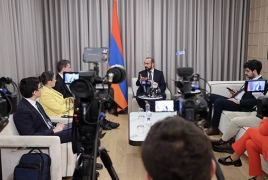
Armenia’s Foreign Minister Ararat Mirzoyan stated in an interview with Turkish media during the Antalya Diplomacy Forum that the peace agreement between Armenia and Azerbaijan could potentially be signed at the border between the two countries.
"Regarding the location, you know, it's not essential. There is an idea to sign it at the Armenia-Azerbaijan border. Several other capitals have offered to host it. I don’t rule anything out. I haven’t received such a proposal yet, but I don’t exclude any option," he said.
Mirzoyan noted that both sides have successfully agreed on the content of the peace document, and the full text is ready for signing. "This is a significant achievement. I would say it's a historic event, something unprecedented. Imagine—after a long-standing conflict and bloodshed in our region, Armenia and Azerbaijan have reached an agreement on the text," he emphasized.
He mentioned that Armenia has formally proposed to Azerbaijan to begin discussions on the time and place for signing the treaty. However, Baku has not yet provided a final response regarding future meetings.
"There is no update on this. They say their position is that they won’t discuss it until certain demands are met—first one, then the second, then the third, and so on. This is the reality. Still, we continue our communication," Mirzoyan added, according to the Ministry of Foreign Affairs.
One of these demands concerns the dissolution of the OSCE Minsk Group. Mirzoyan explained that Armenia is ready to initiate the process, reasoning that if the conflict no longer exists, the structure overseeing it is also unnecessary. He noted that Armenia proposed signing two documents simultaneously—the peace agreement and a joint appeal to the OSCE to dissolve the Minsk Group.
Mirzoyan also addressed Azerbaijan’s concerns regarding Armenia’s Constitution. According to him, Baku points to a reference in Armenia’s Constitution preamble to the Declaration of Independence, which may be interpreted as a territorial claim. He clarified that only some parts of the Declaration hold legal weight, and the peace treaty provision fully addresses Azerbaijan's concerns.
"The treaty stipulates mutual recognition of each other’s territorial integrity based on the borders that existed when our countries were Soviet Socialist Republics at the time of the Soviet Union’s collapse, and which later received international recognition. This clause fully addresses Azerbaijan's concerns and aligns with our understanding as well," he said.
The minister added that the treaty must be submitted to Armenia’s Constitutional Court during the ratification phase to ensure it aligns with the Constitution.
"This is our legal process. If the Constitutional Court concludes that the provision, the formulation, fully complies with our Constitution—meaning it contains no territorial claims beyond internationally recognized borders, which Azerbaijan finds acceptable—then there is no problem. The solution is within the agreement itself, not outside it. The quickest path is signing and ratifying the peace agreement," Mirzoyan added.
While not ruling out a possible negative conclusion from the Court, he expressed confidence that there are sufficient grounds to expect a positive assessment. He recalled that in September of last year, the Constitutional Court had already evaluated a bilateral document—the regulation on delimitation commissions—and found it fully compliant with the Constitution.
"We signed another document with Azerbaijan—the first-ever bilateral international document between our two countries—setting the rules for the delimitation commissions. That regulation reaffirmed that the basis for delimitation should be the Almaty Declaration, which, as I noted, refers to the borders existing at the time of the Soviet collapse. Again, we submitted it to our Constitutional Court, and it confirmed that the document fully complied with our Constitution. Therefore, I have good reason to believe the same will hold true for the peace agreement," the Foreign Minister said.
Mirzoyan also raised Armenia’s concerns about Azerbaijan’s Constitution.
"This is not merely a mirrored argument. In their Constitution, they too reference their Declaration of Independence, which claims that the current Republic of Azerbaijan is the successor of the first Azerbaijan Democratic Republic—not the Soviet one. That republic, which existed before the USSR, declared sovereignty over territories far beyond today’s Azerbaijan, including over 60% of Armenia’s current territory. So we also have concerns. But why don’t we raise them repeatedly? Because, as I said, the solution lies in the peace agreement. We sign it, and the issue is resolved. Period," said Mirzoyan.
In closing, he emphasized Armenia’s constructive and flexible stance. He noted that extensive work has been done on the agreement, and the document is fully ready for signature.
"There is no peace agreement in the world that answers every possible question. When societies have a history of hostility and conflict, one document can’t solve everything. The peace agreement envisions the creation of a bilateral mechanism—a commission that will oversee implementation and handle any challenges and uncertainties that may arise during the process. In other words, we are creating tools to manage those challenges. Therefore, expecting all issues to be resolved before signing is neither fair nor realistic," he said, stressing that there is no alternative to negotiations.
On March 13, Armenia’s Foreign Ministry announced it had accepted Azerbaijan’s proposals on two previously disputed articles and that the peace agreement is ready for signature. Armenia is ready to discuss the timing and venue for signing, while Baku has introduced new preconditions and stated it is premature to discuss the date.

